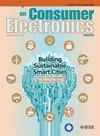Efficient Gaussian Process Classification-Based Physical-Layer Authentication With Configurable Fingerprints for 6G-Enabled IoT
IF 10.9
2区 计算机科学
Q1 ENGINEERING, ELECTRICAL & ELECTRONIC
引用次数: 0
Abstract
The future 6G-enabled IoT will facilitate seamless global connectivity among ubiquitous wireless devices, but this advancement also introduces heightened security risks such as spoofing attacks. Physical-Layer Authentication (PLA) has emerged as a promising, inherently secure, and energy-efficient technique for authenticating IoT terminals. Nonetheless, the direct application of state-of-the-art PLA schemes to 6G-enabled IoT encounters two major hurdles: inaccurate channel fingerprints and the inefficient utilization of prior fingerprint information. To tackle these challenges, we leverage Reconfigurable Intelligent Surfaces (RISs) to enhance fingerprint accuracy. Additionally, we integrate active learning and Gaussian Processes (GPs) to propose an Efficient Gaussian Process Classification (EGPC)-based PLA scheme, aiming for reliable and lightweight authentication. Following Bayes’ theorem, we model configurable fingerprints using GPs and employ the expectation propagation method to identify unknown fingerprints. Given the difficulty of obtaining sufficient labeled fingerprint samples to train PLA models, we propose three fingerprint selection algorithms. These algorithms select unlabeled fingerprints and query their identities using upper-layer authentication mechanisms. Among these methods, the optimal algorithm reduces the number of training fingerprints needed through importance sampling and eliminates the requirement for PLA model retraining through joint distribution calculation. Simulations results reveal that, in comparison with non-RIS-based approaches, the RIS-aided PLA framework decreases the authentication error rate by 98.69%. In addition, our designed fingerprint selection algorithms achieve a reduction in the authentication error rate of up to 86.93% compared to baseline active learning schemes.基于高斯过程分类的高效物理层身份验证与可配置指纹,用于支持6g的物联网
未来支持6g的物联网将促进无处不在的无线设备之间的无缝全球连接,但这一进步也带来了更高的安全风险,例如欺骗攻击。物理层身份验证(PLA)已经成为一种有前途的、固有的安全和节能的物联网终端身份验证技术。尽管如此,将最先进的PLA方案直接应用于支持6g的物联网会遇到两个主要障碍:不准确的通道指纹和对先前指纹信息的低效利用。为了应对这些挑战,我们利用可重构智能表面(RISs)来提高指纹的准确性。此外,我们将主动学习和高斯过程(GPs)相结合,提出了一种基于高效高斯过程分类(EGPC)的PLA方案,旨在实现可靠和轻量级的身份验证。根据贝叶斯定理,利用GPs对可配置指纹进行建模,并采用期望传播方法对未知指纹进行识别。鉴于难以获得足够的标记指纹样本来训练PLA模型,我们提出了三种指纹选择算法。这些算法选择未标记的指纹,并使用上层认证机制查询指纹的身份。其中,最优算法通过重要性采样减少了训练指纹的数量,通过联合分布计算消除了PLA模型再训练的需要。仿真结果表明,与非基于ris的方法相比,ris辅助PLA框架的认证错误率降低了98.69%。此外,与基线主动学习方案相比,我们设计的指纹选择算法将认证错误率降低了86.93%。
本文章由计算机程序翻译,如有差异,请以英文原文为准。
求助全文
约1分钟内获得全文
求助全文
来源期刊
CiteScore
7.70
自引率
9.30%
发文量
59
审稿时长
3.3 months
期刊介绍:
The main focus for the IEEE Transactions on Consumer Electronics is the engineering and research aspects of the theory, design, construction, manufacture or end use of mass market electronics, systems, software and services for consumers.

 求助内容:
求助内容: 应助结果提醒方式:
应助结果提醒方式:


